Sulbutiamine
- CAS NO.:3286-46-2
- Empirical Formula: C32H46N8O6S2
- Molecular Weight: 702.89
- MDL number: MFCD01726427
- EINECS: 221-937-3
- SAFETY DATA SHEET (SDS)
- Update Date: 2024-11-20 15:18:15
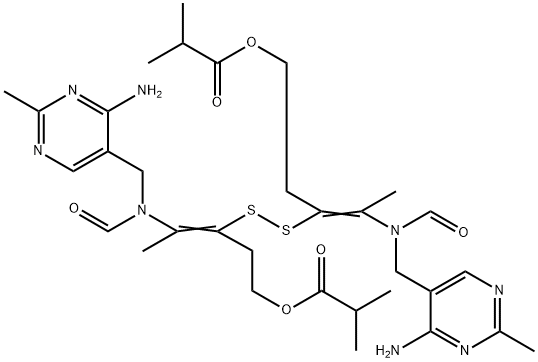
What is Sulbutiamine?
Description
Sulbutiamine is a vitamin B1 derivative developed by the French Servier Pharmaceuticals. The product is described in Special Drug Patent 5921M as a formulation with vitamin B1 activity, which is able to increase the blood level of vitamin B1 and has a therapeutic effect on all vitamin B1 deficiencies.
Chemical properties
Sulbutiamine is a white solid. It is a synthetic compound, which consists of two thiamine molecules bound together by a sulfur group. Due to the fact that sulbutiamine is a dimer of two thiamine molecules, it is a lipophilic drug that crosses the blood-brain barrier more quickly than thiamine(Farid and Abdelwahab,2016).Thus, sulbutiamine has neurotropic action and can increases the levels of thiamine and thiamine phosphate esters in the brain (Sevim et al.,2017).
The Uses of Sulbutiamine
Sulbutiamine (isobutyryl thiamine disulfide) is a lipophilic derivative of thiamine used for the treatment of asthenia and other related pathological conditions. Sulbutiamine is available over-the-counter in several countries as a component of nutritional supplements.
What are the applications of Application
Sulbutiamine is a lipophilic derivative of thiamine
Benefits
Sulbutiamine belongs to the class of medicines called an artificial vitamin. It contains Sulbutiamine, which is similar to vitamin B1 (thiamine). It is used for the symptomatic treatment of asthenia. SULBUTIAMINE works by increasing the thiamine levels in the brain. It is thought to have mild stimulant effects. Thereby it improves memory and reduces feelings of weakness. It may also be used in combination with other medicines to improve everyday activities in Alzheimer's disease.
General Description
Sulbutiamine is a synthetic derivative of thiamine (vitamin B1) under the market name Arcalion that is composed of two modified thiamine molecules to form a dimer. It is highly lipophilic, allowing it to cross the blood-brain barrier more easily than other thiamine derivatives. Although its clinical efficacy is not yet defined, sulbutiamine is used to treat asthenia. While its other uses include improvement of erectile dysfunction and reduction of psycho-behavioural inhibition, sulbutiamine showed evidence of modulatory effect on dopaminergic and glutamatergic cortical transmissions. The chronic administration of the drug has demonstrated to improve long term memory formation in mice.
Side Effects
Sulbutiamine is very well tolerated at normal doses, with the only reported side effects at normal doses being mild headaches, nausea, and a decline in mood. At very high doses, mild agitation and skin irritation is sometimes reported. For this reason it is not recommended to exceed a dose of 4 capsules per day. Please consult with your physician before taking Sulbutiamine.?
Safety
Sulbutiamine is a very safe drug, but its effects vary widely depending on the individual. Some people consider it too stimulating yet others find its effects sedative. Despite possible stimulation sulbutiamine is not thought to cause insomnia. Depression and anxiety have been reported occasionally. Large doses can cause headaches. No drug interactions or contraindications are known, but it has been suggested that people with bipolar disorder should not use sulbutiamine.
Properties of Sulbutiamine
| Melting point: | 140.5-141.5 °C |
| Boiling point: | 892.5±65.0 °C(Predicted) |
| Density | 1.1323 (rough estimate) |
| refractive index | 1.7400 (estimate) |
| storage temp. | under inert gas (nitrogen or Argon) at 2-8°C |
| solubility | Chloroform (Slightly), DMSO (Slightly), Methanol (Slightly) |
| form | Solid |
| pka | 5.82±0.10(Predicted) |
| color | White to Off-White |
| Merck | 14,9297 |
| Stability: | Hygroscopic |
| CAS DataBase Reference | 3286-46-2(CAS DataBase Reference) |
Safety information for Sulbutiamine
Computed Descriptors for Sulbutiamine
| InChIKey | CKHJPWQVLKHBIH-UHFFFAOYSA-N |
| SMILES | C(CCOC(=O)C(C)C)(SSC(CCOC(=O)C(C)C)=C(C)N(C=O)CC1=CN=C(C)N=C1N)=C(C)N(C=O)CC1=CN=C(C)N=C1N |
New Products
4-AMINO-TETRAHYDRO-PYRAN-4-CARBOXYLIC ACID HCL 4-(Dimethylamino)tetrahydro-2H-pyran-4-carbonitrile 4-Aminotetrahydropyran-4-carbonitrile Hydrochloride (R)-3-Aminobutanenitrile Hydrochloride 3-((Dimethylamino)methyl)-5-methylhexan-2-one oxalate 1,4-Dioxa-8-azaspiro[4.5]decane 5-Bromo-2-nitropyridine Nimesulide BP Aceclofenac IP/BP/EP Diclofenac Sodium IP/BP/EP/USP Mefenamic Acid IP/BP/EP/USP Ornidazole IP Diclofenac Potassium THOMAIND PAPER PH 2.0 TO 4.5 1 BOX BUFFER CAPSULE PH 9.2 - 10 CAP SODIUM CHLORIDE 0.1N CVS ALLOXAN MONOHYDRATE 98% PLATINUM 0.5% ON 3 MM ALUMINA PELLETS (TYPE 73) LITHIUM AAS SOLUTION 2-Bromo-1-(bromomethyl)-3-chloro-5-nitrobenzene 2-Bromo-3-nitroaniline N-(3-Hydroxypropyl)-N-methylacetamide 3-Bromo-6-chloropyridazine 4-ethyl-3-nitrobenzoic acidRelated products of tetrahydrofuran

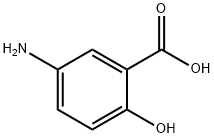

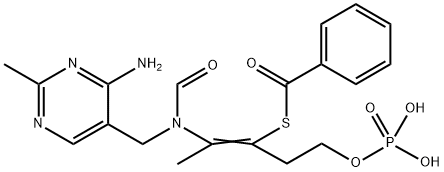
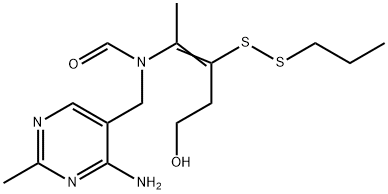

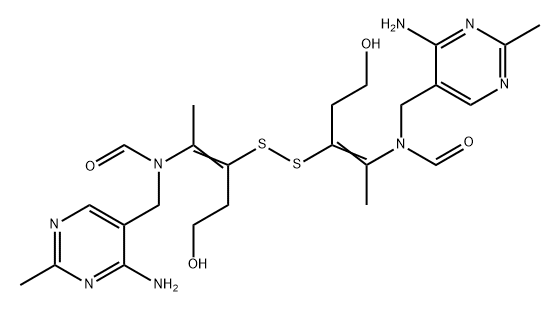

You may like
-
 Sulbutiamine CAS 3286-46-2View Details
Sulbutiamine CAS 3286-46-2View Details
3286-46-2 -
 Sulbutiamine 97% (HPLC) CAS 3286-46-2View Details
Sulbutiamine 97% (HPLC) CAS 3286-46-2View Details
3286-46-2 -
 1823368-42-8 98%View Details
1823368-42-8 98%View Details
1823368-42-8 -
 2-(3-(tert-butyl)phenoxy)-2-methylpropanoic acid 1307449-08-6 98%View Details
2-(3-(tert-butyl)phenoxy)-2-methylpropanoic acid 1307449-08-6 98%View Details
1307449-08-6 -
 Ethyl 3-(furan-2-yl)-3-hydroxypropanoate 25408-95-1 98%View Details
Ethyl 3-(furan-2-yl)-3-hydroxypropanoate 25408-95-1 98%View Details
25408-95-1 -
 2-Chloro-5-fluoro-1-methoxy-3-methylbenzene 98%View Details
2-Chloro-5-fluoro-1-methoxy-3-methylbenzene 98%View Details
1805639-70-6 -
 1784294-80-9 98%View Details
1784294-80-9 98%View Details
1784294-80-9 -
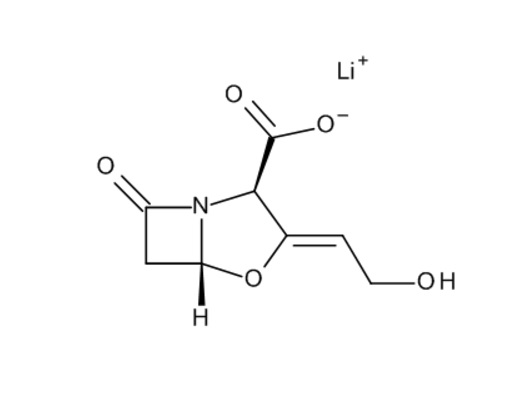 Lithium ClavulanateView Details
Lithium ClavulanateView Details
61177-44-4